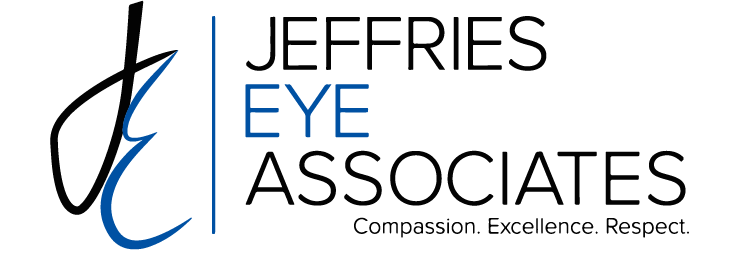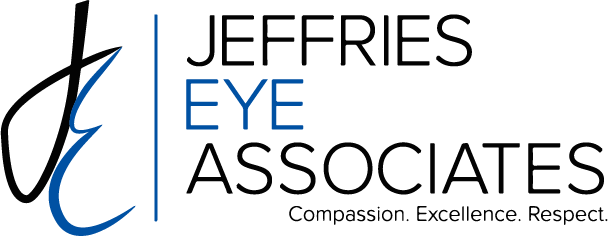Comprehensive Eye Exam
Eye Exam in Rogers
You might have heard the old saying, “Eyes are windows to the soul.” One thing we know at Jeffries Eye Associates is that eyes provide insight into our overall health. Regular eye exams are essential for your vision health, but they can also be an important part of your overall health and wellness. In fact, comprehensive eye exams can help detect serious health problems such as diabetes and high blood pressure.
Comprehensive eye exams at Jeffries eye Associates assess your visual acuity as well as your overall eye health. Often, eye diseases do not have obvious symptoms in the early stages. That’s why regular eye exams are so important. Our trained doctors can diagnose eye conditions at an early stage and provide treatment options to help prevent and in many cases restore vision loss. The most advanced diagnostic technology enables us to check for serious eye problems such as cataracts, glaucoma, macular degeneration, and diabetic retinopathy.
To keep your eyes safe, healthy, and functioning, the
American Academy of Ophthalmology recommends you see
an eye care specialist every one to two years,
depending on the health of your eyes.
What to Expect at Your Eye Exam
At the beginning of your exam, we will ask you questions about any eye symptoms you are experiencing, your work environment, medications you are currently taking, and your overall health. We might also discuss your family history and any previous eye conditions or symptoms at this time. This information is important to know when determining any treatments or recommendations. Because the eye is a complex organ, your eye exam will involve several tests.
Vision Testing
A visual acuity test measures how each eye is seeing. This is the test that first comes to mind when you think about an eye exam. You’ll cover one eye at a time while you try to read the smallest line you can from an eye chart. “Normal” vision is 20/20, and it describes the sharpness of vision at 20 feet from an object. If your vision is 20/60, you must be at 20 feet to see what a person with normal vision can see at 60 feet.
If you are in need of glasses or contact lenses, a refraction will be done by your eye doctor to determine your prescription. You will look through a phoropter, a device that contains different lenses. This is where you will be asked, “which is clearer, one or two?”. Your answers will help your doctor decide what prescription will work best for you.
Eye Function Testing
In addition to vision testing, a comprehensive eye exam includes testing eye functionality. Your doctor will perform several tests to evaluate depth perception, color vision, eye muscle capabilities, peripheral vision, and responsiveness to light. In addition, several simple tests will help determine whether the eyes are focusing, moving, and working together properly. Eye function test results help your doctor to diagnose any underlying conditions that may be impairing the eyes ability to focus or work together.
Eye Health Examination
Lastly, your doctor will examine the overall health of your eye through a visual examination using a slit-lamp, an instrument consisting of a microscope and a high-intensity light source. The slit-lamp allows your doctor to visually inspect structures at the front of your eye such as the cornea, iris, and lens very closely. To examine the internal structures in the back of the eye, the pupil is dilated to make a larger opening so your doctor can get a better view. A slit-lamp examination can evaluate more serious eye problems such as cataracts, cornea damage, dry eye syndrome, macular degeneration, and diabetic retinopathy, to name a few.
Increased eye pressure may be an indicator of glaucoma. Glaucoma is a disorder that can damage certain layers of the retina, which can lead to blindness if left untreated. Applanation tonometry is used to measure pressure in your eye, so no air puff is necessary.
Depending on the results of your examination, your doctor may recommend further testing using advanced diagnostic imaging. Jeffries Eye Associates uses the most up to date diagnostics equipment, so you can be sure you’re getting the best care possible. So whether you’re experiencing eye problems or not, regular comprehensive eye exams are important for preserving your vision for life.


